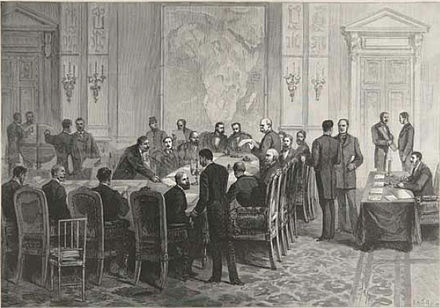

34 of the LPA and referred to in UNSC resolutions 24, leading to a comprehensive and lasting cessation of all hostilities including air operations over the territory of Libya. We call for credible, verifiable, sequenced and reciprocal steps, including credible steps towards the dismantling of armed groups and militias by all parties as per art. We reiterate the vital task of the Special Representative of the Secretary General of the United Nations in this regard. We call on all parties concerned to redouble their efforts for a sustained suspension of hostilities, de-escalation and a permanent ceasefire. We welcome the marked reduction in violence since January 12th and the negotiations undertaken in Moscow on January 13th as well as all other international initiatives aimed at paving the way towards a ceasefire agreement. We stress that a durable solution in Libya requires a comprehensive approach that addresses simultaneously the different aspects. We fully support the good offices and mediation efforts of the United Nations Support Mission to Libya (UNSMIL) and SRSG Salamé. In this context we welcome the organization by the African Union of the Reconciliation Forum in the spring of 2020.Ĩ.


All these International Organisations will closely work together. We recognize the central role of the United Nations to facilitate an inclusive intra-Libyan political and reconciliation process, based on the Libyan Political Agreement of 2015 and its institutions, UNSC Resolution 2259 (2015), other relevant UNSC Resolutions and the principles agreed in Paris, Palermo and Abu Dhabi, as well as the important roles of the African Union and its High Level Committee of Heads of State and Government on Libya, the League of Arab States, the European Union and the neighboring countries in Libya’s stabilization with particular regard to intra-Libyan national reconciliation, peace and security and political dialogue. We commit to refraining from interference in the armed conflict or in the internal affairs of Libya and urge all international actors to do the same.ħ. There can be no military solution in Libya.Ħ. The “Berlin Process”, in which we engaged to support the three-point-plan presented by Special Representative of the UN Secretary-General (SRSG) Ghassan Salamé to the United Nations Security Council (UNSC), has the sole objective of assisting the United Nations in unifying the International Community in their support for a peaceful solution to the Libyan crisis. We are committed to support Libyans in addressing those structural governance and security issues.ĥ. It has facilitated a destabilizing wave of illegal migration in the region and an important deterioration of the humanitarian situation. It has allowed Al Qaida and ISIS to flourish on the Libyan territory and to launch operations in Libya and in neighboring countries. The conflict in Libya, the instability in the country, the external interferences, the institutional divisions, the proliferation of a vast amount of unchecked weapons and the economy of predation continue to be a threat to international peace and security by providing fertile grounds for traffickers, armed groups and terrorist organizations. Only a Libyan-led and Libyan owned political process can end the conflict and bring lasting peace.Ĥ. We reaffirm our strong commitment to the sovereignty, independence, territorial integrity and national unity of Libya. We, the participants, note the Co-Chair’s statement on the political, security and humanitarian situation in Libya of the meeting at Foreign Ministers’ level convened by France and Italy on the margins of the 74th General Assembly of the UN in New York on 26 September 2019.ģ. Today’s Berlin Conference on Libya, at the invitation of German Chancellor Merkel, has gathered the Governments of Algeria, China, Egypt, France, Germany, Italy, Russia, Turkey, the Republic of the Congo, United Arab Emirates, the United Kingdom and the United States of America and High Representatives of the United Nations, the African Union, the European Union, and the League of Arab States.Ģ.


 0 kommentar(er)
0 kommentar(er)
